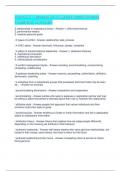3 relationships in expectancy theory - Answer-1. effort-performance
2. performance-reward
3. rewards-personal goals
/.3 types of conflict - Answer-relationship, task, process
/.4 DISC styles - Answer-dominant, influencer, steady, compliant
/.4 pillars of transformational leadership - Answer-1. idealized influence
2. inspirational motivation
3. intellectual stimulation
4. individualized consideration
/.5 conflict management styles - Answer-avoiding, accommodating, compromising,
competing, collaborating
/.6 goleman leadership styles - Answer-coercive, pacesetting, authoritative, affiliative,
democratic, coaching
/.a individual from a subordinate groups that possesses dominant traits may be seen
as... - Answer-an anomaly
/.accommodating dimensions - Answer-unassertive and cooperative
/.accomodating - Answer-parties who seek to appease a negotiation partner and may
be willing to place the partner's interests above their own to maintain the relationship
/.affiliative style - Answer-people first approach that values individuals and their
emotions more than tasks & goals
/.anchoring bias - Answer-tendency to fixate on initial information and fail to adequately
adjust to subsequent information
/.attribution theory - Answer-theory that explains how we judge people differently
depending on the meaning we attribute to their behavior
/.authentic leadership - Answer-self-aware leaders who value genuine relationships, are
rooted in their values, serve others, and have a vision for the future
/.authentic leadership primary focus - Answer-compelling vision & service to others,
being genuine
, /.authoritative style - Answer-vision & mission driven leader who clearly explains how
everyone fits into organization
/.availability bias - Answer-tendency to base judgements on readily available information
/.avoiding - Answer-parties who withdraw from conflict
/.avoiding dimensions - Answer-unassertive and uncooperative
/.basic psychological needs - Answer-autonomy, competence, relatedness
/.bounded rationality - Answer-a simplified process of making decisions by perceiving
and interpreting the essential features of problems without capturing their complexity
/.CET argues that ___ motives are more sustaining in long term - Answer-intrinsic
/.characteristics of affiliative style - Answer-emotionally bonded, loyal, enhances
communication and flexibility, offers positive reinforcement, vulnerable
/.characteristics of authoritative - Answer-enhances climate, committed to goals, allows
flexibility, provides feedback
/.characteristics of coaching style - Answer-uses mistakes as teachable moments, hows
support employee self-development, gives feedback, positive on climate & performance,
flexible
/.characteristics of coercive leadership - Answer-removes flexibility, damages reward
system, undermines motivation
/.characteristics of democratic style - Answer-enhances flexibility and responsibility
/.characteristics of mythical norm - Answer-White, thin, male, young, heterosexual,
Christian, and financially secure
/.characteristics of pacesetting - Answer-morale drops as people are overwhelmed,
flexibility and responsibility diminish, either no feedback or micromanaging
/.coaching style - Answer-leader acts as a counselor, career mentor, and coach
/.coercive style - Answer-extreme top-down style of leadership & decision-making
/.cognitive evaluation theory - Answer-sub-theory of self-determination theory in which
extrinsic rewards can decrease motivation if rewards are seen as controlling or reduce
their sense of competence




